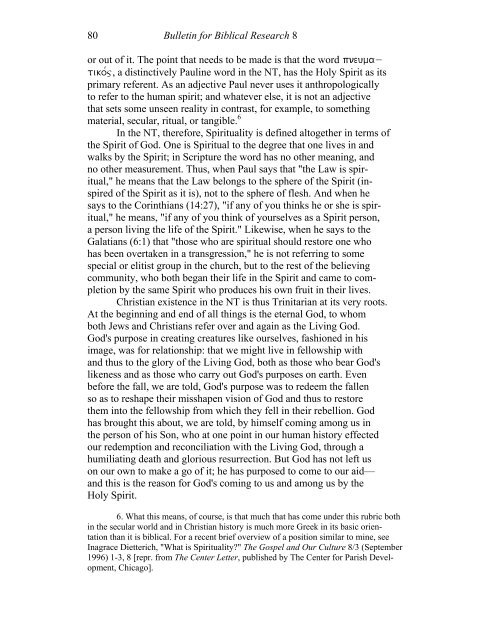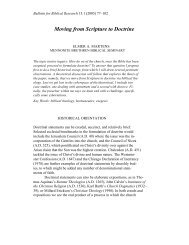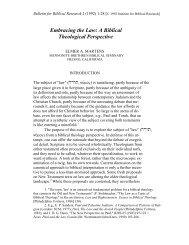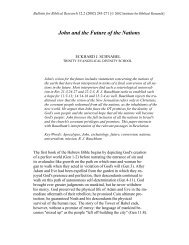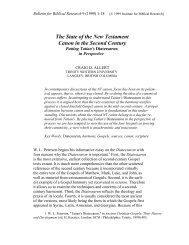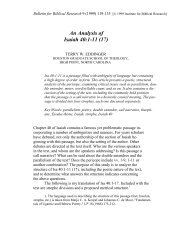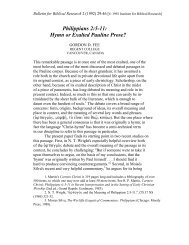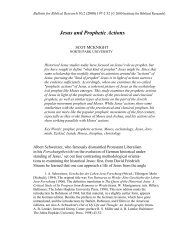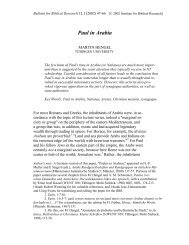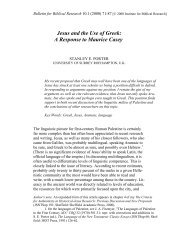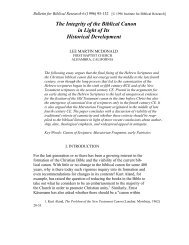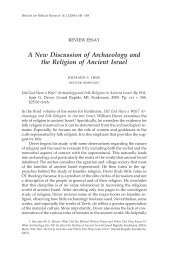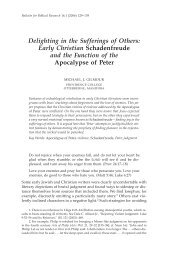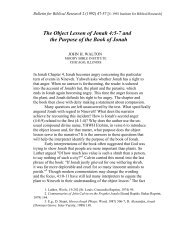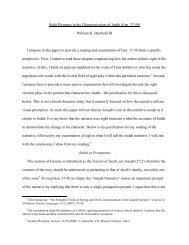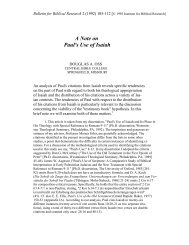Reflections on Exegesis and Spirituality in Philippians 4:10-20
Reflections on Exegesis and Spirituality in Philippians 4:10-20
Reflections on Exegesis and Spirituality in Philippians 4:10-20
You also want an ePaper? Increase the reach of your titles
YUMPU automatically turns print PDFs into web optimized ePapers that Google loves.
80 Bullet<strong>in</strong> for Biblical Research 8<br />
or out of it. The po<strong>in</strong>t that needs to be made is that the word pneumatiko/j,<br />
a dist<strong>in</strong>ctively Paul<strong>in</strong>e word <strong>in</strong> the NT, has the Holy Spirit as its<br />
primary referent. As an adjective Paul never uses it anthropologically<br />
to refer to the human spirit; <strong>and</strong> whatever else, it is not an adjective<br />
that sets some unseen reality <strong>in</strong> c<strong>on</strong>trast, for example, to someth<strong>in</strong>g<br />
material, secular, ritual, or tangible. 6<br />
In the NT, therefore, <strong>Spirituality</strong> is def<strong>in</strong>ed altogether <strong>in</strong> terms of<br />
the Spirit of God. One is Spiritual to the degree that <strong>on</strong>e lives <strong>in</strong> <strong>and</strong><br />
walks by the Spirit; <strong>in</strong> Scripture the word has no other mean<strong>in</strong>g, <strong>and</strong><br />
no other measurement. Thus, when Paul says that "the Law is spiritual,"<br />
he means that the Law bel<strong>on</strong>gs to the sphere of the Spirit (<strong>in</strong>spired<br />
of the Spirit as it is), not to the sphere of flesh. And when he<br />
says to the Cor<strong>in</strong>thians (14:27), "if any of you th<strong>in</strong>ks he or she is spiritual,"<br />
he means, "if any of you th<strong>in</strong>k of yourselves as a Spirit pers<strong>on</strong>,<br />
a pers<strong>on</strong> liv<strong>in</strong>g the life of the Spirit." Likewise, when he says to the<br />
Galatians (6:1) that "those who are spiritual should restore <strong>on</strong>e who<br />
has been overtaken <strong>in</strong> a transgressi<strong>on</strong>," he is not referr<strong>in</strong>g to some<br />
special or elitist group <strong>in</strong> the church, but to the rest of the believ<strong>in</strong>g<br />
community, who both began their life <strong>in</strong> the Spirit <strong>and</strong> came to completi<strong>on</strong><br />
by the same Spirit who produces his own fruit <strong>in</strong> their lives.<br />
Christian existence <strong>in</strong> the NT is thus Tr<strong>in</strong>itarian at its very roots.<br />
At the beg<strong>in</strong>n<strong>in</strong>g <strong>and</strong> end of all th<strong>in</strong>gs is the eternal God, to whom<br />
both Jews <strong>and</strong> Christians refer over <strong>and</strong> aga<strong>in</strong> as the Liv<strong>in</strong>g God.<br />
God's purpose <strong>in</strong> creat<strong>in</strong>g creatures like ourselves, fashi<strong>on</strong>ed <strong>in</strong> his<br />
image, was for relati<strong>on</strong>ship: that we might live <strong>in</strong> fellowship with<br />
<strong>and</strong> thus to the glory of the Liv<strong>in</strong>g God, both as those who bear God's<br />
likeness <strong>and</strong> as those who carry out God's purposes <strong>on</strong> earth. Even<br />
before the fall, we are told, God's purpose was to redeem the fallen<br />
so as to reshape their misshapen visi<strong>on</strong> of God <strong>and</strong> thus to restore<br />
them <strong>in</strong>to the fellowship from which they fell <strong>in</strong> their rebelli<strong>on</strong>. God<br />
has brought this about, we are told, by himself com<strong>in</strong>g am<strong>on</strong>g us <strong>in</strong><br />
the pers<strong>on</strong> of his S<strong>on</strong>, who at <strong>on</strong>e po<strong>in</strong>t <strong>in</strong> our human history effected<br />
our redempti<strong>on</strong> <strong>and</strong> rec<strong>on</strong>ciliati<strong>on</strong> with the Liv<strong>in</strong>g God, through a<br />
humiliat<strong>in</strong>g death <strong>and</strong> glorious resurrecti<strong>on</strong>. But God has not left us<br />
<strong>on</strong> our own to make a go of it; he has purposed to come to our aid—<br />
<strong>and</strong> this is the reas<strong>on</strong> for God's com<strong>in</strong>g to us <strong>and</strong> am<strong>on</strong>g us by the<br />
Holy Spirit.<br />
6. What this means, of course, is that much that has come under this rubric both<br />
<strong>in</strong> the secular world <strong>and</strong> <strong>in</strong> Christian history is much more Greek <strong>in</strong> its basic orientati<strong>on</strong><br />
than it is biblical. For a recent brief overview of a positi<strong>on</strong> similar to m<strong>in</strong>e, see<br />
Inagrace Dietterich, "What is <strong>Spirituality</strong>?" The Gospel <strong>and</strong> Our Culture 8/3 (September<br />
1996) 1-3, 8 [repr. from The Center Letter, published by The Center for Parish Development,<br />
Chicago].


